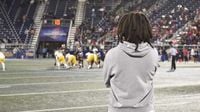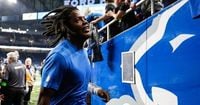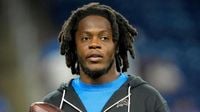In a surprising turn of events, former NFL quarterback and current Miami Northwestern High School football coach Teddy Bridgewater has been suspended amid allegations of providing impermissible benefits to his players. The 32-year-old coach confirmed his suspension on July 13, 2025, via a heartfelt Facebook post, while firmly expressing his commitment to remain with his alma mater despite the setback.
Bridgewater’s suspension comes shortly after he publicly revealed that he had been covering a range of expenses for his players during the 2024 season. These included Uber rides, pregame meals, and athletic recovery services—costs he initially shouldered out of his own pocket. In a July 7 post, Bridgewater appealed to fans and supporters to help fund these expenses for the 2025 season, seeking donations to ease the financial burden on himself and ensure continued support for his team.
According to reports, Bridgewater was paying approximately $700 weekly for Uber rides, $2,200 for pregame meals, and $1,300 for recovery services. Beyond these, he also covered other team needs such as training camp expenses and equipment. The generosity, however, has drawn scrutiny from the Florida High School Athletic Association (FHSAA), which enforces strict rules on amateurism and impermissible benefits in high school sports.
FHSAA official Kelvin Richardson confirmed to Rivals that the association has forwarded the allegations to Miami Northwestern and is actively gathering more information. This investigation follows a precedent set last fall when The First Academy was penalized for similar violations, receiving a two-year postseason ban and a $36,000 fine after players were found to have accepted impermissible benefits including free Uber rides.
Despite the suspension, Bridgewater remains defiant and dedicated. In his Facebook statement, he wrote, "The suspension came from MNW and it’s impossible to suspend someone who doesn’t work for you. So if I'm suspended from MNW I'm free to go to another school of my choice but IM NOT GOING ANYWHERE. And if it comes down to it, I will volunteer from the bleachers like I used to in 2018 and 2019 when no one had a problem." His resolve underscores a deep connection to Miami Northwestern, where he first made his mark as a standout player and now as a coach.
Bridgewater’s coaching tenure at Miami Northwestern has been marked by immediate success. In his first season at the helm in 2024, he led the Bulls to a Class 3A state championship—their first since 2019—posting a dominant 12-2 record. The Bulls finished the season ranked No. 6 in Florida according to the Rivals Composite High School Team Rankings and have entered the 2025 season ranked No. 4 by Massey Ratings. Expectations are high as the team prepares to open the season against Lakeland on August 16, followed by a marquee interstate matchup against California’s Orange Lutheran on August 23.
The Bulls boast a talented roster, including returning starting quarterback Leon Strawder and incoming transfer Niemann Lawrence. The defense is anchored by future Power Four players, such as Georgia commit James Johnson, Miami commit Jordan Campbell, Pitt-bound Desmond Johnson, and Florida State pledge Tedarius Hughes. This strong lineup suggests Miami Northwestern is poised to remain a powerhouse under Bridgewater’s guidance—if he is allowed to continue coaching.
Bridgewater’s journey to coaching success is a compelling story. Drafted in the first round of the 2014 NFL Draft by the Minnesota Vikings following a standout college career at Louisville, he quickly rose to prominence, earning a Pro Bowl selection in 2015 after leading the Vikings to an 11-5 season. However, his career was nearly derailed by a catastrophic knee injury in 2016 that required extensive rehabilitation and altered his trajectory.
Despite this, Bridgewater battled back, serving as a starter for the Carolina Panthers and Denver Broncos and later playing for the New York Jets, New Orleans Saints, Miami Dolphins, and Detroit Lions. He retired from the NFL in February 2024 to pursue coaching at Miami Northwestern but briefly unretired in December 2024 to serve as backup for the Lions. During that playoff run, he completed his only pass attempt for three yards in a divisional round loss to the Washington Commanders before returning to his coaching role.
Bridgewater finished his NFL career with 15,120 passing yards, 75 touchdowns, and a 66.4% completion rate, a testament to his resilience and skill. His transition from player to coach has been closely watched, with many lauding his leadership and ability to inspire young athletes.
However, the impermissible benefits controversy casts a shadow over his burgeoning coaching career. FHSAA rules prohibit school employees or representatives from providing benefits that violate amateurism policies, including covering transportation, meals, or recovery services. The association’s investigation will determine whether Miami Northwestern and Bridgewater face further sanctions similar to those imposed on The First Academy.
Miami Northwestern itself has faced scrutiny in recent years. Last season, the Bulls were investigated for using an ineligible player, although that inquiry was ultimately closed without penalty. The current situation with Bridgewater adds complexity to the program’s reputation and future outlook.
Bridgewater’s social media posts have also stirred additional controversy. In May 2025, the Miami Northwestern athletic department publicly distanced itself from comments he made supporting Carol City principal Bridget McKinney, highlighting ongoing tensions within the school community.
With the 2025 football season fast approaching, all eyes will be on Miami Northwestern to see how the suspension and investigation unfold. The Bulls are equipped with talent and a strong coaching philosophy, but the uncertainty surrounding Bridgewater’s status could impact their momentum.
For now, Bridgewater’s message is clear: he remains loyal to Miami Northwestern and is willing to continue contributing in any capacity. Whether that means coaching from the sidelines or volunteering from the stands, his dedication to the young athletes he mentors is unwavering.
As the FHSAA investigation proceeds, the broader conversation about support and resources for high school athletes—especially in economically disadvantaged communities—comes into focus. Bridgewater’s efforts to provide meals and transportation highlight the challenges faced by programs operating with limited funding and the fine line coaches must walk within regulatory frameworks.
The story of Teddy Bridgewater’s suspension is still unfolding, but it underscores the complexities of high school sports in today’s landscape, where passion, rules, and the welfare of players intersect in often challenging ways.



